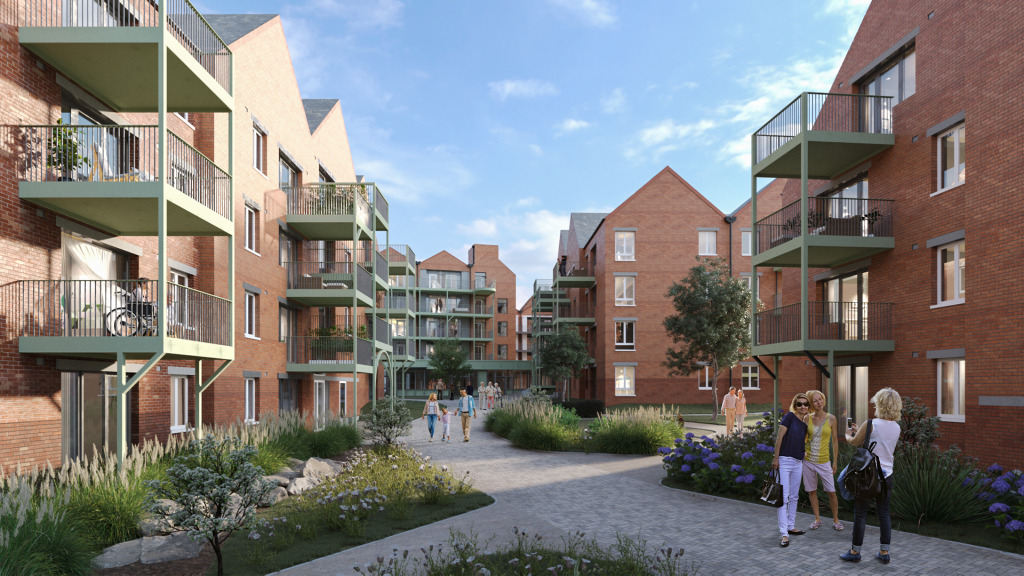The Subplot
The Subplot | Boomer property, hotels, policy failure
Welcome to The Subplot, your regular slice of commentary on the business and property market from across the North of England and North Wales.
THIS WEEK
- Senior living: prosperous pensioners are attracting developers to build for them, but will everyone else get the senior living options they need?
- Elevator pitch: your weekly rundown of who and what is going up, and who is heading the other way
GREY POUNDS, BRIGHT PROSPECTS
The ultimate Boomer property proposition
There’s a new three-letter acronym for you to get used to: integrated retirement communities (IRC). We’ll see lots more of them in the North.
You better get used to IRCs. Ranging in size from modest to monster, integrated retirement communities provide senior living from supported homes right up to care beds, sometimes even dementia care. In the past few months plans have popped up for substantial IRC developments at the Dore Moor Garden Centre in Sheffield by Inspired Living; Bootham Park Hospital in York by Enterprise Retirement Living; and Boughton Heath in Chester by Retirement Villages Group.
Nimby trouble
But it’s not a smooth ride. There would have been one at Alderley Park, under Vita Group’s Symphony Park brand, if local councillors hadn’t decided it wasn’t to be permitted in their back yard, despite officials recommending approval. Many IRCs are described as “luxury” (the Alderley Park scheme, for instance) and plainly some neighbourhoods don’t welcome them. Today just 1% of the over-65s live in IRCs, amounting to 88,000 units, according to Cushman & Wakefield. Back in 2021, Subplot reported on the difficulties and opportunities here: things have moved on, but the scale of development hasn’t.
Money talks
Yet the weight of money means the IRC market is likely to keep growing because it’s a good bet for the big-money investors – funds, institutions, private equity, Americans, and Asians – now scouring the land for opportunities. A recent analysis for the British Property Federation suggested £6.5bn was ready and waiting in 2022/2023. Actually spending it – see the Alderley Park example – turns out to be harder than many expected.
Microscopic
It’s a new and tiny market. There are just over 600,000 senior housing units of any description in the UK (yes, isn’t it mad?), and all but a handful are dated or dating. Just 7,000 additional units are built each year, about 4,000 in IRCs, the rest various kinds of public sector projects. Bear in mind that there are more than 12m people aged over 65.
Business case
The appeal of IRCs is clear: nice regular income. For investors, the appeal is similar to BTR and student housing, and the pool of potential investors is widening just as it has for BTR and student housing: once dominated by patient capital, but now private equity wants a share of the action.
Not just for the rich
But will the wider senior living sector get moving? Or will IRC remain a niche, and a very tiny niche at that? And remember even the iciest business soul wants this to go mass market because that improves the market’s growth prospects and liquidity, more buyers, more sellers… whereas a microscopic niche suits no one. The British Property Federation report was authored by a team at Cushman & Wakefield, so Subplot asked the consultancy’s specialist researcher Millie Todd what we should expect in the North.
It’s coming
“What’s been delivered so far has tended to be higher end, for sale or rental. But a middle market is emerging with a couple of providers – Audley, Birch Group – aiming for mid-range. I expect this will work like the BTR market, with a start at the prime end because it’s easier to get the numbers to stack up, given high land prices and debt costs. But there is huge demand and I would expect more provision in the mid range as the market matures,” she says. JLL thinks there’s demand for 725,000 housing-with-care units by 2025. Compare this with the 7,000-a-year annual output and you begin to grasp the problem.
But it depends on politicians
Cushman & Wakefield says there are developers and operators interested in all levels – from super-prime to affordable – and all locations (though not every location is going to get every level). The difficulty is that local councils don’t seem very bothered – see Alderley Edge again. “Some have no senior housing allocation at all,” says Todd, of local authority planning strategies. “Without public policy intervention we won’t get products fit for everyone’s financial and locational needs,” she adds.
A market to watch, but until local and central government focus on the sector, it is likely to remain focused on upscale IRCs, and the kind of locations that can support them, and therefore marginal to most pensioners’ housing needs.
 ELEVATOR PITCH
ELEVATOR PITCH
Going up, or going down? This week’s movers
A levelling-up policy idea is languishing in the basement: it doesn’t matter how many times you press that button, this one’s going nowhere. However, hotel development is racing towards the penthouse. Doors closing, going up!
 Hotel development
Hotel development
Last week Subplot flagged data showing hotel room rates looking good. This week saw more real-life data – qualitative and quantitative – to suggest the sector still has room to grow.
Adrian Ellis, manager at the luxury Lowry Hotel Manchester, and chair of the city’s hoteliers’ association, tells Subplot the huge surge in new city hotel beds in 2022 (up 1,500 in a single year) hasn’t hurt room rates or occupancy.
“Events in the city are generating a lot of leisure traffic and the conference business is also back. Perhaps corporate activity is still a bit slow, but not as bad as we thought it would be. Hotel development is at a frenetic pace, but we’ll all survive,” he says.
The new specialist Manchester Accommodation Business Improvement District (Manchester Abid), which is using a tourist levy of £1 a night to raise funds to inspire yet more visitor-generating events, has had a smooth landing since its launch in April, Ellis tells Subplot.
Deloitte says the 2023 and 2024 Manchester pipeline is 500 and 188 respectively, which is sober by comparison with 2022 but still perfectly respectable.
There’s real growth in Leeds, too. Deloitte suggests there are around 390 beds under construction in 2023 and the same due in 2024: in the context of a fairly sluggish local market, this is a frenzy, the best on record since 2006.
 Jam tomorrow
Jam tomorrow
Could be a false alarm, or a re-announcement of things we’ve already heard, but rumours are floating around that chancellor Jeremy Hunt will use his annual Mansion House speech to city financiers to announce movements on the long-trailed plan to change pension and insurance rules to allow these funds to spend more, and keep less on hand.
At first, the idea was to rejig the regulatory regime to provide a big slug of infrastructure money without having to put up taxes, and thereby promote levelling up. As Subplot has been reporting over the years, the Solvency II slash Big Bang 2.0 slash Boris’s Levelling Up Golden Bullet plan has so far come to nothing (1 June 2023, and follow the links back).
The project now seems to be reframed as an effort to allow funds to invest in riskier growth stock – start-ups and tech companies, basically – and rather less about levelling up. The snag is that pension funds are not really big on risk, for obvious reasons. The rule change wouldn’t force them to do anything anyway, and it’s not clear sensible start-ups struggle to get funding. Keep your eye on the news in the next few days for signs this one has vanished up its own policy backside.
Get in touch with David Thame: [email protected]





